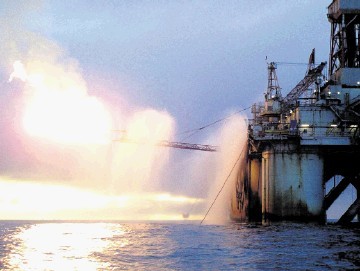
Oil companies are planning to splash out almost £100billion on projects in UK waters – delivering a massive boost to the north and north-east economy.
Thousands of jobs are being created and tens of thousands of people will be kept in work as the energy business makes its biggest investment for more than 30 years.
Industry body Oil and Gas UK said this massive cash injection follows the introduction of tax changes designed to encourage growth in Britain’s oil and gas sector.
Its 2013 activity survey, out today, shows a mix of investment plans, ranging from projects of less than £50million through to some of more than £1billion.
Last night, politicians and energy experts said the study showed the North Sea would be key to lifting Scotland and the UK out of recession.
Spending in British waters has been rising steadily – from £8.5billion in 2011 to £11.4billion in 2012 and a projected £13.5billion this year. Oil and Gas UK chief executive Malcolm Webb said: “Here is some really good news for the UK.
“The UK continental shelf is now benefiting from record investment in new developments and in existing assets and infrastructure – the strongest for more than three decades. The recent introduction of targeted tax allowances to promote the development of a range of difficult projects, coupled with the government’s commitment to provide certainty on decommissioning tax relief, has prompted global companies and independent businesses alike to take another look at the UK as an investment destination and resulted in a new wave of investment.”
Thanks to changes in the tax regime, more oil and gas reserves have become viable to extract. Just days ago, the UK Government gave Norwegian energy giant Statoil the go-ahead for one of the biggest projects in the North Sea yet.
The £4.5billion Mariner heavy oil field is said to be the largest new offshore development in the UK in more than a decade.
Statoil plans to recruit 200 staff for a new Aberdeen operations centre, plus a further 500-plus UK jobs offshore. The UK’s daily production fell to 1.55million barrels of oil equivalent in 2012, down by 14% from 2011 and by 30% from 2010.
Oil and Gas UK said much of this fall could be attributed to the damage done to investor confidence by the numerous adverse tax changes in the mid-2000s.
The industry body said production may fall again slightly this year to 1.45million-1.5million barrels a day but, thanks to the recent surge in investment, a significant upturn is now predicted over the next three to four years, hitting about 2million barrels a day by 2017 – with significant benefits for the UK economy.
Recommended for you
